Childhood is a crucial stage in our development, and the experiences we have during this period shape our personalities and worldviews in many ways. Unfortunately, some childhoods can be traumatic, leaving deep emotional scars. There are eight types of childhood trauma that can have a profound impact on a child’s development and future life outcomes.
A traumatic childhood can have significant long-term effects on a person’s mental, physical, and emotional well-being, which can last well into adulthood. The childhood wounds suffered by someone can end up defining their entire life, including their choices, relationships, and values.
Before we delve into the different types of childhood trauma, it’s important to know what is exactly childhood trauma.
Related: How Childhood Wounds End Up Haunting You, Even In Your Adulthood
What Is Childhood Trauma?
Childhood trauma refers to experiences that can cause emotional pain and distress in children, often leading to negative long-term effects on their physical, emotional, and mental health.
It can have a profound impact on a child’s developing brain and can affect their behavior, relationships, and overall well-being. Children who experience trauma may develop coping mechanisms that can affect their ability to function in everyday life.
For instance, they may become hypervigilant, easily triggered, or have difficulty regulating their emotions.
Younger children may have trouble sleeping, and eating, or may regress in their behavior, while older children may engage in risky behaviors or have difficulty building genuine, healthy, and close personal relationships.
It is crucial to understand that childhood trauma can affect any child, regardless of their background or social status. Trauma can occur in any environment, including the home, school, or community. Children who are exposed to poverty, violence, or substance abuse may be at a higher risk of experiencing trauma.
Now, let’s find out what are the types of childhood trauma or what are the different types of childhood trauma.
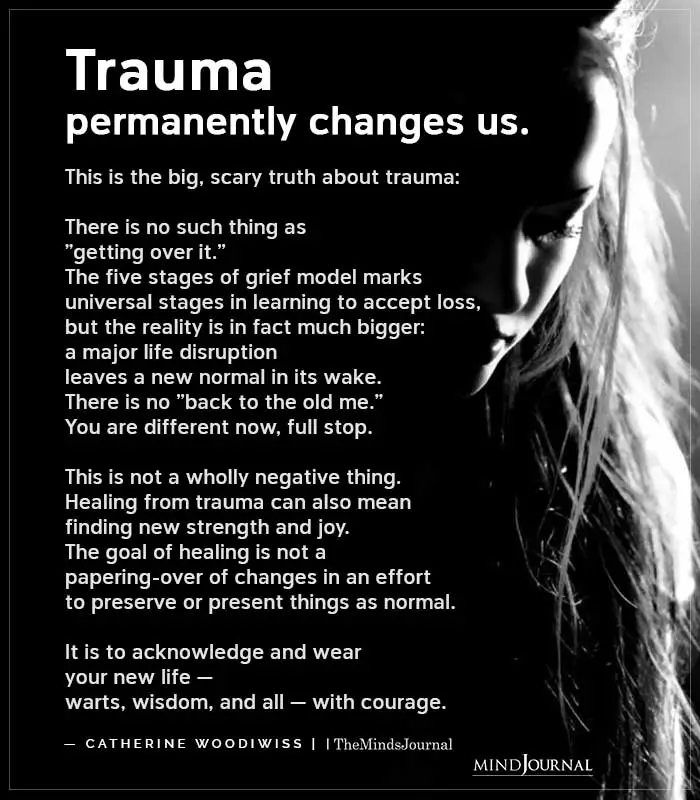
8 Types Of Childhood Trauma
1. Physical Abuse
Physical abuse is one of the most visible and well-known types of childhood trauma. It involves the intentional use of force to cause harm or injury to a child, including hitting, kicking, shaking, or burning. Physical abuse can be perpetrated by parents, caregivers, or other adults in a child’s life.
Children who experience physical abuse are at risk of developing a range of mental health problems, including anxiety, depression, and post-traumatic stress disorder (PTSD).
They may also struggle with feelings of shame, guilt, and low self-esteem, and may have difficulty forming healthy relationships as adults.
2. Sexual Abuse
Sexual abuse involves any sexual activity or behavior with a child that is non-consensual or inappropriate for their age and developmental stage.
It can include physical contact, such as touching or penetration, as well as non-contact forms of abuse, such as exposure to pornography or sexualized language.
The effects of sexual abuse on a child’s mental health can be profound and long-lasting. Children who experience sexual abuse are at increased risk of developing depression, anxiety, and PTSD.
They may also struggle with sexual dysfunction, substance abuse, and self-harm. Even after entering adulthood, they might struggle to build healthy relationships and end up in abusive and dysfunctional relationships.
Related: How An Unloving Mother Can Ruin Her Child’s Chance At Happiness
3. Emotional Abuse
This is one of the most painful and insidious types of childhood trauma out there.
Emotional abuse is any behavior that harms a child’s emotional well-being or development. This can include verbal abuse, such as name-calling or insults, as well as nonverbal abuse, such as withholding affection or attention.
It can also involve manipulation, belittling, and the use of threats or intimidation against the child.
Children who experience emotional abuse at an early age may develop a negative self-image and may struggle with anxiety, depression, and other mental health issues. They may also have difficulty forming healthy relationships and may have trust issues, that even spill into adulthood.
Studies have shown that emotionally abusive behavior leads to changes in the brains of kids, which can ultimately prove to be detrimental when it comes to their emotional and physical development and health.
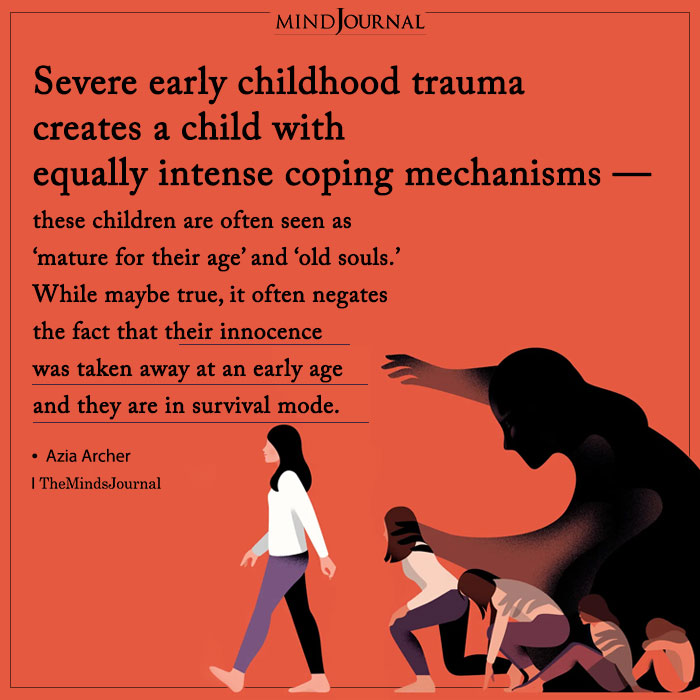
4. Household Or Family Dysfunction
Household dysfunction refers to any situation in which a child is exposed to family conflict, substance abuse, mental illness, or other issues that can affect their development and well-being. This can include parental divorce, domestic violence, substance abuse, or a parent’s incarceration.
Children who grow up in households with dysfunction may develop anxiety, depression, and other serious mental illnesses. They also suffer from massive trust issues, which leads to them being unable to form genuine relationships with others, be it friendships or romantic relationships.
Growing up in a dysfunctional household can haunt you for the rest of your life, and also lead to feelings of worthlessness, low self-esteem, and low self-confidence.
5. Neglect Or Negligence By Parents
A child is neglected when their parents or caregivers fail to provide them with the basic necessities of life, including food, shelter, clothing, and medical care. Neglect can be physical, emotional, or educational.
Physical neglect can lead to malnutrition, illness, and physical harm. Emotional neglect can lead to a lack of social and emotional development, low self-esteem, and difficulty forming healthy relationships. Educational neglect can lead to poor academic performance and limited opportunities later in life.
Being neglected by your parents as a child is one of the most horrible, scary, and traumatic things to go through in life. When the very people who are supposed to protect you and take care of you, end up treating you like garbage, it can change the way you look at the world and at yourself.
Neglect is one of the worst types of childhood trauma there is, and also one of the most insidious ones.
Related: Understanding The Dynamics Of A Dysfunctional Family And 5 Ways To Recover From One
6. Community Violence
Community violence is a pervasive and distressing problem that affects many individuals living in urban or inner-city areas. It involves the experience of violence or crime in the community, such as witnessing or being a victim of physical assault, robbery, or gang violence.
Children who are exposed to community violence may experience a range of negative emotional and psychological consequences. They may develop anxiety, depression, and post-traumatic stress disorder (PTSD), which can significantly impact their social, emotional, and cognitive functioning.
Children may also struggle with concentration, sleeping, and regulating their emotions, leading to problems in school, difficulty forming relationships with others, and a lack of engagement in social activities.
Additionally, community violence can have long-term effects on the health and well-being of children as they grow into adulthood.
Exposure to violence in childhood has been linked to a range of negative health outcomes, including chronic illnesses, substance abuse, and mental health problems.
7. Medical Trauma
Medical trauma can have a profound impact on children’s physical, emotional, and psychological well-being, and is one of the subtle types of childhood trauma that can have long-term effects on their psyche.
Medical trauma occurs when a child experiences a serious illness or injury, or undergoes a medical procedure that is painful, frightening, or distressing. This can include chronic illnesses, hospitalization, surgery, or medical treatment for a life-threatening illness.
Children who experience medical trauma may develop a range of negative emotional and psychological outcomes. They may experience anxiety, depression, and even post-traumatic stress disorder (PTSD).
They may also have difficulty forming healthy relationships, particularly with medical professionals, and may struggle with issues related to body image and self-esteem.
In addition to the emotional and psychological effects, medical trauma can also have physical consequences. Children may experience pain, fatigue, and other symptoms related to their illness or injury, which can impact their ability to participate in school and social activities.
They may also experience side effects from medical treatment, such as nausea, hair loss, or other changes to their physical appearance.

8. Imprisonment Or Incarceration Of A Parent
This is one of those types of childhood trauma that is not spoken a lot about, and there is indeed a lack of awareness about this.
The imprisonment of a parent can have profound and lasting effects on children. Not only do they lose the regular presence of a parent, but they also face a host of challenges that can significantly impact their psychological and emotional well-being.
One of the most significant challenges that children of incarcerated parents face is the loss of regular contact with their parent.
This loss can be especially devastating for young children who may not fully understand why their parent is absent. Moreover, they may feel a sense of abandonment and rejection, which can lead to feelings of low self-worth and poor self-esteem.
Children of incarcerated parents may also face social stigma and discrimination, which can exacerbate feelings of isolation and shame. This can lead to further psychological distress and social withdrawal.
Additionally, they might have difficulty trusting authority figures or understanding appropriate boundaries, leading to behavioral issues and conflicts with peers and caregivers.
Related: 10 Anxious Behaviors That Could Actually Be Trauma Responses
How To Overcome Childhood Trauma?
Despite all the pain, humiliation, and torment you may have gone through, fortunately, there are ways to heal childhood wounds and move towards a healthier, and more fulfilling life.
Here’s how to deal with childhood trauma:
1. Seek Professional Help.
Opting for therapy for healing childhood wounds is one of the best things you can do for yourself.
A mental health professional can provide guidance and support, and help individuals develop strategies for managing and coping with their trauma.
There are several types of therapy that can be effective in treating childhood trauma, such as cognitive-behavioral therapy, EMDR (Eye Movement Desensitization and Reprocessing), and trauma-focused therapy.
2. Connect with Supportive People.
This is one of the best things you can do for yourself if you are trying to deal with childhood trauma.
It is essential to surround yourself with supportive people who understand and validate your experiences. This can include your friends, family members, and/or support groups.
Connecting with others who have experienced similar trauma can be especially helpful in feeling understood and supported.
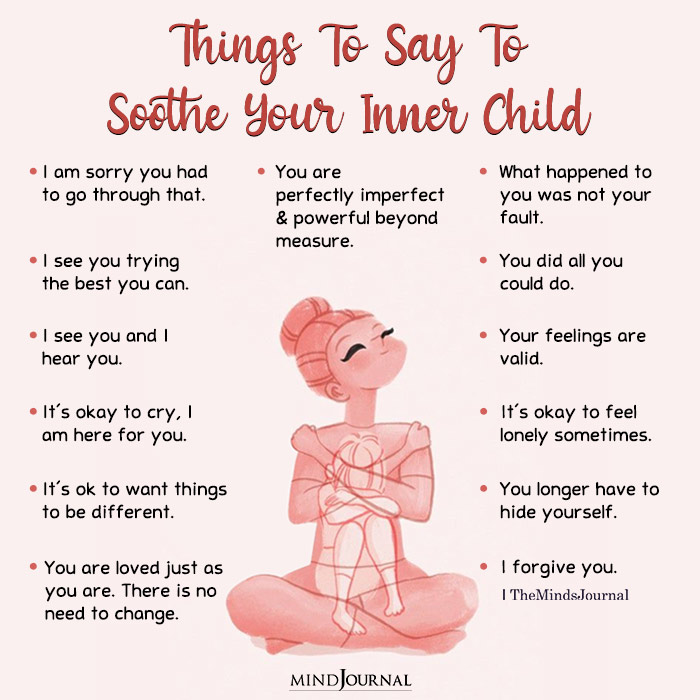
3. Develop Coping Mechanisms.
Developing healthy coping mechanisms is essential if you’re trying to overcome childhood trauma. Individuals can learn to identify their triggers and develop strategies to manage them, such as mindfulness techniques, deep breathing exercises, or meditation.
Engaging in physical activities, such as yoga or exercise, can also help manage stress and anxiety.
Related: 6 Stages Of Healing For Survivors Of Childhood Family Trauma
4. Practice Forgiveness.
Forgiving those who have caused childhood trauma can be a challenging but powerful step in healing childhood wounds.
Forgiveness does not mean forgetting or excusing the behavior, but it can help individuals let go of anger and resentment and move towards a place of healing and growth.
5. Express Your Feelings.
Expressing your feelings through writing, art, or other creative outlets can be a helpful tool in processing and healing childhood wounds.
Creative expression can help individuals explore their emotions in a safe and non-judgmental way, leading to a greater sense of self-awareness and healing.
6. Challenge Negative Beliefs.
People who have experienced childhood trauma may have negative beliefs about themselves, others, and the world. These beliefs can impact their thoughts and behaviors, leading to a cycle of negative thinking.
Challenging negative beliefs and replacing them with positive and realistic ones can be a powerful tool if you’re trying to overcome childhood trauma.

7. Embrace Positivity.
Focusing on positive experiences and emotions can help individuals shift their mindset towards a more positive outlook.
Practicing gratitude, engaging in activities that bring joy, and surrounding oneself with positive people can be helpful strategies when it comes to defeating and healing your childhood wounds.
Related: How To Heal From Childhood Trauma When Its Hampering Your Mental Health
Takeaway
Healing childhood wounds is a complex process that requires patience, self-compassion, and support. Different types of childhood trauma can have different impacts on individuals, but one thing that stays the same is the pain one goes through.
Acknowledging what you went through and taking steps toward healing your childhood wounds is the first step toward living a more resilient, happy, and positive life.
Did you have a happy childhood, or are you someone who knows what it feels like to go through childhood trauma and overcome it? Let us know your thoughts in the comments down below!
Want to know more about the different types of childhood trauma? Check this video out below!
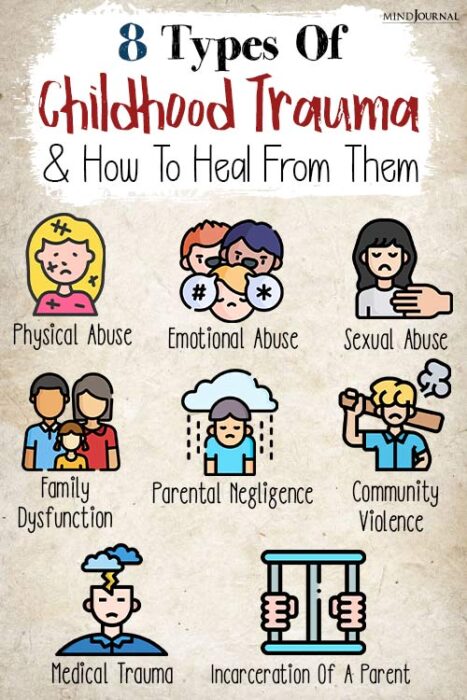
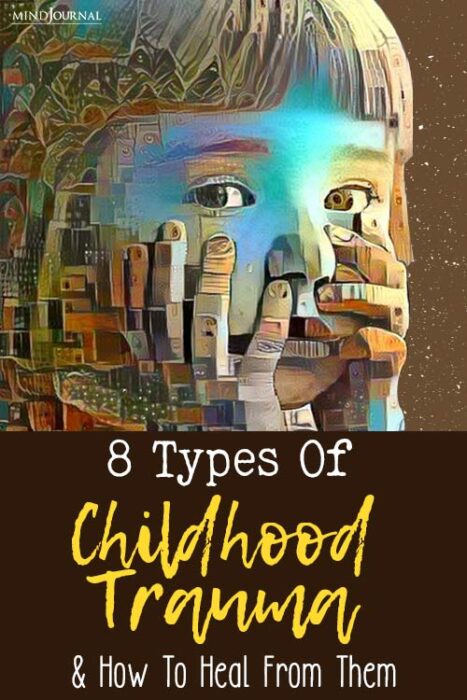
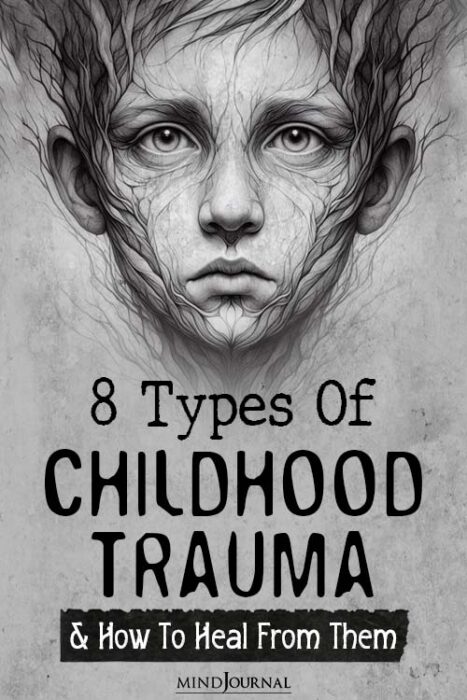
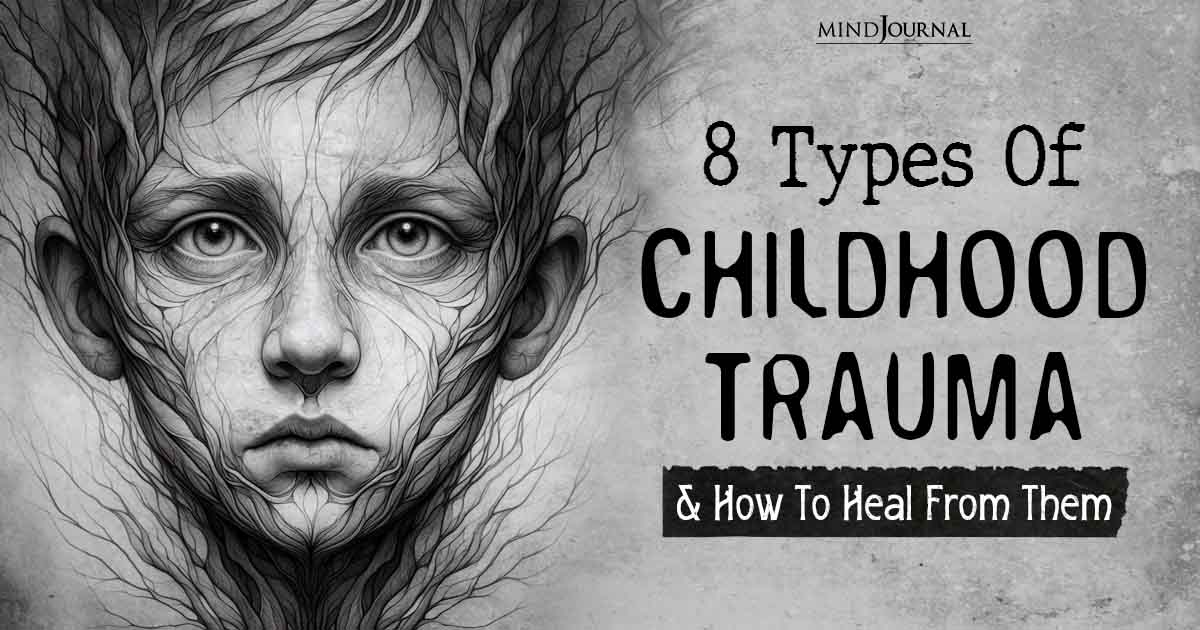







Leave a Reply
You must be logged in to post a comment.